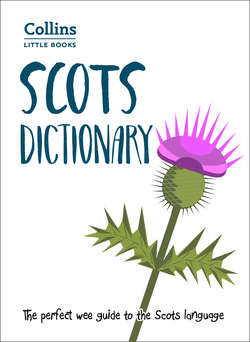Читать книгу Scots Dictionary: The perfect wee guide to the Scots language - Collins Dictionaries, Collins Dictionaries - Страница 13
Оглавлениеbarley
barley Barley is a cry used, chiefly in the East of Scotland, to call for a period of truce or a temporary halt to a game among children at play, used, for instance, when someone is hurt or needs to tie their shoelaces. In Western Scotland, the word used is usually keys. [The word is probably derived from parley, a ceasefire for discussion]
barley bree See bree.
baronial (ba-roe-ni-al) The baronial style of architecture is one popular in the 19th century in which buildings are ornamented with pseudo-medieval features such as turrets and mock battlements: The magnificent turreted Scottish baronial style of the exterior of the hotel.
barra (ba-ra) A barra is a wheelbarrow. Something which is right into one’s barra is ideal and exactly in line with one’s interests or desires. To fancy one’s barra is to have an unduly high opinion of oneself. In the Glasgow area, a wee barra is an informal way of referring to any small person that the speaker likes, or at least does not dislike. The Glasgow flea market is known as The Barras.
barrie or barry (bar-ri) Something which is barrie is very good or very attractive: Your hair looks really barrie like that; We’d a really barrie time. [The word, which is of Romany origin, is mainly used in Edinburgh and the Southeast]
bashit Bashit vegetables are ones which have been mashed: bashit neeps.
bastartin (bass-ter-tin) or bastardin (bass-ter-din) Bastartin is a swear word used, like damned or bloody, to indicate dislike or annoyance: Watch whit yir daein wi that bastartin hammer!
bate (bait) Bate is a Scots form of beat or beaten: We got bate wan nil.
bauchle (bawCH-l) or bachle (baCH-l) A bauchle was originally a shabby or worn-out shoe. Nowadays the word bauchle is usually used to describe an ungainly or shabby-looking person, especially a small one: a wee bauchle.
bauldie or baldie (bawl-di) Someone who is bauldie or bauldie-heidit is bald: a wee bauldie guy. A bauldie is a bald person. A bauldie is also a very short haircut: You wouldn’t notice I’d had my hair done even if I got a right bauldie, would you?
bawbag (baw-bag) The bawbag is a colloquial term for the scrotum. In the Glasgow area, bawbag is also used as an insult to a person.
bawbee (baw-bee) A bawbee was originally a silver coin worth six Scots pennies. Later, bawbee came to mean a halfpenny. Although the halfpenny no longer exists, the word bawbee is still used to mean any small amount of money, especially in phrases implying miserliness or shortage of money: the current economic climate – otherwise known as a serious lack of bawbees. [The coin was probably named after Alexander Orrok of Sillebawby, who became master of the Scottish mint in 1538]
bawface A bawface is a round, chubby face, or a person with such a face.
bawheid (baw-heed) Bawheid basically means the same as bawface. However, it can also be used as a cheeky form of address for a person: Hey, bawheid!
beadle A beadle, also known as a kirk officer or church officer, is a paid official of the Church of Scotland, whose job includes assisting a minister with administrative work and placing the Bible in the pulpit at the start of a service.
beamer A beamer is a red face caused by embarrassment or guilt, or something which is so embarrassing or bad that it causes such a blush. The word is mainly used in the Glasgow area.
bear A bear is a usually derogatory term for a wild and uncouth young man, particularly one who drinks a lot: The bar closed long before the bears’ drooth was assuaged.
beast Among farmers, a beast is a calf, cow, bull, or bullock, irrespective of its age or sex. The plural can be either beasts or beas.
